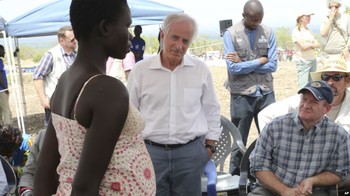South Sudan’s leaders hijacked institutions to enrich themselves, say US Senators

Two US Senators said South Sudan’s political and military leaders have hijacked and repurposed state institutions to enrich themselves and fuel violence, calling for the deployment of additional tools to hold those leaders accountable for the ongoing violence in the world’s youngest nation.
In a letter addressed to US Treasury Secretary Steve Mnuchin, Senate Foreign Relations Committee Chairman Bob Corker and Senator Chris Coons said the United States has a strong and unique bond with the people of South Sudan through America’s key role in the formation of South Sudan as an independent state.
“Despite initial optimism about the future of the world’s newest country, the people of South Sudan have spent the past three years entangled in a brutal conflict, which has spiralled out of control, with more than two million people internally displaced and almost two million forced from the country,” partly reads the two Senators’ letter.
The US politicians said that the international diplomatic response to the ongoing conflict in the East African nation failed and donors have focused on the urgent necessity of providing humanitarian relief to which the US has contributed almost $3 billion since December 2013.
“The United States must simultaneously address the structural problems that enable kleptocracy, incentivize violence, and prevent peace,” says the letter.
The two Senators demanded a more transparent and responsible government in the future, adding that this includes regional responsibility for impunity and the negative fiscal and human impact it has on stability and development in the region.
Corker and Coons called upon the Treasury to also focus on deploying financial tools that target the financial networks of those obstructing peace and dispersing the proceedings of corruption through the region, and even through America’s financial system.
“We ask the Treasure Department to act to hold South Sudanese leaders accountable. We urge you to investigate corruption, impose network-focused sanctions, identify hidden assets and collaborate with international anti-money laundering standard setting bodies,” says the letter.
They pointed out that this step will send a signal to Juba and the region that mis-governance by political and military elites will no longer be provided space in the international capital markets for impunity.
“Those fighting in South Sudan will not agree to a sustainable peace until the international community develops more robust leverage and deploys stronger pressure,” said the two US Senators.
“We believe the United States can increase the pressure and change the calculations of those profiting from conflict,” they added.
The two US politicians pointed out that their intent is to cut off the free flow of resources to the political and military leaders, their families and associates through Uganda and Kenya, engagement with international financial institutions and network-focused sanctions.
The Senators made the calls to the US Treasury Secretary on 1 August.
On Monday, US Ambassador Molly Phee said her country's relationship with South Sudan now is not strong as it was before, blaming it on continuing fighting, corruption and the mistreatment of aid workers in the world’s youngest nation.